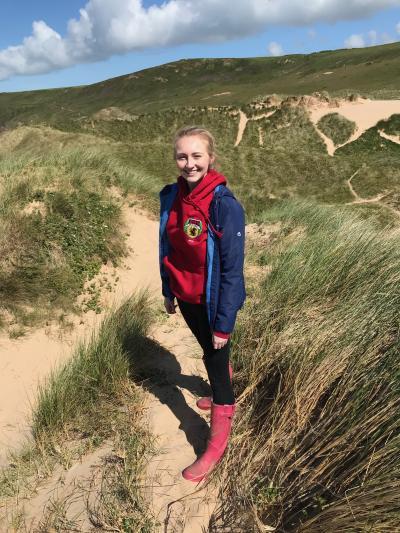
The current recipient of the Heron-Allen Scholarship, Olivia Newby (2018 Biological Sciences), tells us a little about her research interests, how her work has been affected by the current global pandemic and what it means for her to have received the award:
I am very grateful and honoured to receive the Heron-Allen Scholarship for Biological Sciences as the prize money has brought opportunities within my grasp which would have been otherwise unattainable. The topic of biology which interests me most is the study of infectious disease, with HIV being the disease I find of most interest. I find HIV so fascinating because it is only a relatively recent pathogen of humans, originating from a region of West Africa in the 1920’s, yet it has already evolved numerous complex immune evasion mechanisms, causing the search for cures and vaccines to be particularly elusive. I had planned to undertake a piece of original research during Trinity Term of 2020 in the HIV research group of the Nuffield Department of Medicine Research Building which has unfortunately had to be cancelled during the current period of social distancing. The aim of my project would have been to see whether HIV-2 had a receptor known to be displayed on the surface of HIV-1 and whether the presence or absence of this receptor on HIV-2 caused differential take up of the virus compared to HIV-1. The results may have been of significance, because HIV-2 infection doesn’t necessarily lead to the progression of AIDS, with some people being infected for decades without developing immunodeficiency, whereas people infected with HIV-1 progress to AIDS much more quickly.
The Heron-Allen scholarship has allowed me to explore potential research projects and internships abroad which would have been unattainable without the financial support the scholarship has given me. One internship that caught my eye was a period of shadowing doctors in South Africa, where HIV and tropical disease is prevalent. I would like to have seen how such diseases were diagnosed and treated first hand, as well as observing any social stigma which may be associated with testing HIV-positive. Sadly, the program will not be run this summer due to the coronavirus outbreak. Nevertheless, winning the Heron-Allen Scholarship has given me the confidence that I can be a strong applicant when applying for competitive placements such as this, which I intend to do once the pandemic has passed. Despite the disappointment of the cancellation of my project and other potential internships which cannot be carried out remotely, it is fascinating to live during such unprecedented times, caused by the spread of an emerging infectious disease. Watching as the virus spreads around the globe and brings countries to a standstill has emphasised the importance of the study of epidemiology and immunology to me, and has only made me more certain that this is the field of biology I would like my career to be in.
The scholarship has also relieved some of the financial burden I have faced, meaning I am less dependent on finding part-time jobs during the vacation periods to support my studies at university, allowing me to dedicate more of my time to studying in and around my subject. I can’t express my gratitude enough for the opportunities that the scholarship has unlocked for me and the invaluable experience that it will allow me to gain for my future career. I have great pride that the scholarship has recognised the effort that I put in to my work and it has motivated me to continue working hard for my degree and in my career beyond that.